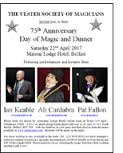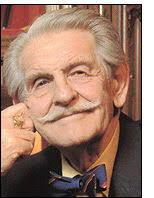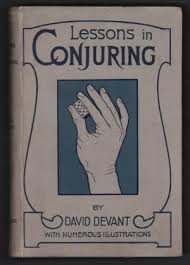May 2017 Newsletter
 |
||
|
26 April 2024 |
||
Hello VisitorWelcome to my May, 2017 Newsletter. The Ulster Society of Magicians
This time my fellow performers were Ali Cardabra and Pat Fallon, with his relatively new assistant Tracie-Jade. We all lectured during the day and then performed after the excellent meal in the evening. Pat and Tracie-Jade opened the show and received a standing ovation. This, of course, meant that Ali and I also received a standing ovation. It would have been very rude of the audience not to be consistent in their demonstration of approval.
I don't tend to go much to conventions these days so it was fun just to chew the fat with a number of knowledgeable magicians. I'm beginning to reach the stage - although to be honest I think I always suffered from it - of forgetting people's names; and I was scratching my head, along with other Irish magicians, over one or two. Fortunately attending was Dr Gábor Szabo, a Hungarian magician, who not only spoke perfect English, but also seemed to know the names of every English and American magician who had slipped our minds. A special thank you to George Bleeks for inviting me over; and to all the Irish magicians who treated me so royally. BGT
This no longer seems to be true: you can be considered brilliant just by doing the trick. Nobody even bothers to ask themselves the question, why is it that an eight year old can apparently do this type of miracle. Has she some special gift? Has she been training since she was a baby? Does she have something equivalent to ‘Rain Man' autistic skills? Is she from a long-line of clairvoyants? All that matters is that she does it. Exactly the same questions can be asked of the double mind-reading act called DNA. Why do they apparently have some sort of telepathy between them? Who cares? The panel was blown away so they must be out of this world. Of course neither of the acts are at fault for exploiting the whole rotten edifice of BGT – which is to produce a show that wants its “that is unbelievable” moments. If the producers like you as an act, anything will be done to make that happen; judicial editing, panellists reactions, off-stage shenanigans. If they don't, then you are either shafted or you end up on the cutting room floor (as indeed happened to one excellent mind reader, with bags of personality, this year). It's hard to envisage either Issy or DNA going all the way - given a magician won the competition last year. But what do I know? Nothing is the answer! Richard Jones & Operation Magic
Comedy WriterAt one time I thought it might be quite fun to earn a living as a comedy writer - as I have in the past come up with an occasional one-liner. However I learnt this week that if you were a writer for the opening monologue for David Letterman's chat show, you had to come up with at least one hundred jokes every time. Lucky I stuck with magic rather than comedy. Dickensian StuffI haven't mentioned much about Charles Dickens in recent newsletters. So here are a couple of snippets. Somebody told me after one of my talks that Dickens put the name of his mistress into a number of his books, but in anagram form. Examples were Bella in Our Mutual Friend, Estella in Great Expectations and Helena Landless in the Mystery of Edwin Drood. Dickens's mistress was called Ellen Ternan. I guess if your definition of an anagram is a word that contains some, but not all, of the letters of another word; but also contains letters which aren't in the original word, then indeed this is true. The phrase "clutching at straws" did spring to mind.
I think it is pushing the truth just a tad to suggest the three books before A Christmas Carol had been failures - not as successful as the Pickwick Papers, Oliver Twist and Nicholas Nickleby would be more accurate. I wonder if they were counting American Notes as one of those three failures, in which case the other two would be Martin Chuzzlewit and Barnaby Rudge. Without American Notes, you would have to go back to The Old Curiosity Shop which did very well. At the time of writing A Christmas Carol, Dickens was most interested in conjuring. Ironic, therefore, that I was asked about Dickens's conjuring for the film The Invisible Woman (regarding Dickens's mistress) when Dickens had long given up conjuring; and not asked about it for this film when he was right in the midst of it. The Magic Circle Magic History Gathering
If you want to see me, then you must arrive on time; as I'm opening the proceedings at around 11 am. The other speakers are Andrey Federov who will present a survey of magic and magicians in Russia; George Kovari on his advisory work for television and the theatre; James Smith on a brief history of magic books as told through the eyes of the sale room; Brian Lead on the lady ventriloquist Josephine Langley and Richard Wiseman and Paul Zenon, who will present ‘Robert Harbin Unseen’. Price is £40 which includes lunch and tea and coffee breaks. If you are interested then contact BobLoomis@TheMagicCircle.co.uk. Sounds to me like an excellent line-up! Pedantry
The quote comes from David Devant's Lessons in Conjuring. During his time at the Egyptian Hall Devant was approached by a young conjurer. "I asked him how many tricks he knew. He made a rapid calculation and replied: 'About three hundred.' I told him I knew eight tricks myself." Devant went onto write that the young man seemed "very puzzled". But also that "he is puzzled no longer by that reply, for he has since learned wisdom and is now a very popular performer." The essence of the anecdote, as related in the Magic Circular, is correct. But of course the addition of the words "but I know them better than anyone else" destroys it. Leaving aside the point that Devant would never have been arrogant enough to say he knew a trick better than anyone else, the crucial part is that he allows the student to work out the reason for his answer himself. That is what a great teacher does; and is part of the reason why Lessons in Conjuring is a great book. Quote of the Month"The presentation of the trick is everything; the little secret round which the performance has been woven is comparatively unimportant." David Devant, Magic Magic Easy "The presentation of the trick is irrelevant; the secret round which the performance has been woven is all important." BGT Dictum |
||
| www.iankeable.co.uk | ian@iankeable.co.uk | Facebook | Twitter |
 Last weekend I spent a most enjoyable couple of days in Ulster as part of The Ulster Society of Magicians 75th anniversary celebrations. I had been over previously for the 60th, where the star was the much missed Billy McComb. He had performed the principal lecture - called the Ted Oldham Memorial Lecture - and this time it was my turn: it was extremely flattering to be associated with Billy in any way whatsoever.
Last weekend I spent a most enjoyable couple of days in Ulster as part of The Ulster Society of Magicians 75th anniversary celebrations. I had been over previously for the 60th, where the star was the much missed Billy McComb. He had performed the principal lecture - called the Ted Oldham Memorial Lecture - and this time it was my turn: it was extremely flattering to be associated with Billy in any way whatsoever. I can't recall when I last received a standing ovation so was very gratified about getting one. But it did make me wonder whether it could be considered 'genuine', given that I was riding on the backs of my two previous performers.
I can't recall when I last received a standing ovation so was very gratified about getting one. But it did make me wonder whether it could be considered 'genuine', given that I was riding on the backs of my two previous performers. So Britain’s Got Talent has returned to our television screens; and this year it would seem to be the battle of the mind readers. The first week there was a double mind-reading act, who were received with rapturous applause and stunned looks from the panel; and the second week there was an eight year old girl doing mind-reading to even more rapturous applause and even greater looks of a stunned nature. I will repeat that in case you think I might have made a slip of a pen – yes, an eight year old girl doing a mind-reading act.
So Britain’s Got Talent has returned to our television screens; and this year it would seem to be the battle of the mind readers. The first week there was a double mind-reading act, who were received with rapturous applause and stunned looks from the panel; and the second week there was an eight year old girl doing mind-reading to even more rapturous applause and even greater looks of a stunned nature. I will repeat that in case you think I might have made a slip of a pen – yes, an eight year old girl doing a mind-reading act. However what BGT has exposed is that the tricks that the majority of so-called mind-readers do are so simple that even an eight year old can perform them. I was always brought up to believe that you can only really be a good mind-reader if your personality is such that it persuades people that you can genuinely read their innermost thoughts.
However what BGT has exposed is that the tricks that the majority of so-called mind-readers do are so simple that even an eight year old can perform them. I was always brought up to believe that you can only really be a good mind-reader if your personality is such that it persuades people that you can genuinely read their innermost thoughts.  I began to watch Operation Magic starring last year's winner of Britain's Got Talent, Richard Jones. I stopped watching after he handed someone a pack of cards and asked him to think of a card; having placed the pack in some sort of container, Richard turned back to the spectator. "What card did you choose?" he enquired. A perfect summary of all I hate about magic on television, where lying to the viewer is now accepted as the norm, encapsulated into two words.
I began to watch Operation Magic starring last year's winner of Britain's Got Talent, Richard Jones. I stopped watching after he handed someone a pack of cards and asked him to think of a card; having placed the pack in some sort of container, Richard turned back to the spectator. "What card did you choose?" he enquired. A perfect summary of all I hate about magic on television, where lying to the viewer is now accepted as the norm, encapsulated into two words. A slightly more authentic piece of news is that a new movie is about to come out called The Man Who Invented Christmas, about the period that Dickens wrote and published A Christmas Carol. The synopsis is as follows: “The film recounts how Charles Dickens created the classic holiday fable, A Christmas Carol. October 1843. Charles Dickens (Dan Stevens) was broke and distressed. Despite early success, his last three books had failed. Rejected by his publishers, he set out to write and self-publish a book he hoped would keep his family afloat. This is the story of the six fever-pitched weeks in which Dickens created A Christmas Carol, the masterpiece that changed the holiday into the merry family event we know today.”
A slightly more authentic piece of news is that a new movie is about to come out called The Man Who Invented Christmas, about the period that Dickens wrote and published A Christmas Carol. The synopsis is as follows: “The film recounts how Charles Dickens created the classic holiday fable, A Christmas Carol. October 1843. Charles Dickens (Dan Stevens) was broke and distressed. Despite early success, his last three books had failed. Rejected by his publishers, he set out to write and self-publish a book he hoped would keep his family afloat. This is the story of the six fever-pitched weeks in which Dickens created A Christmas Carol, the masterpiece that changed the holiday into the merry family event we know today.” This is the annual event for magic collectors and historians which this year takes place on June 10th. And this year yours truly is giving a talk on a subject that I have been researching for some months now - the Bottle Conjurer Hoax of 1749.
This is the annual event for magic collectors and historians which this year takes place on June 10th. And this year yours truly is giving a talk on a subject that I have been researching for some months now - the Bottle Conjurer Hoax of 1749. This seems an appropriate moment to make a correction, given that the History Gathering is on the horizon. In this month's Magic Circular the recent winner of The Magic Circle Close-up Magician of the Year competition is interviewed. He talks about his routines and says that a trick with rings was "framed around the David Devant story about asking his student, 'How many tricks do you know?' to which the student says, 'I know about 300'. The student then asked the question back and Devant says, 'I know about eight, but I know them better than anyone else'."
This seems an appropriate moment to make a correction, given that the History Gathering is on the horizon. In this month's Magic Circular the recent winner of The Magic Circle Close-up Magician of the Year competition is interviewed. He talks about his routines and says that a trick with rings was "framed around the David Devant story about asking his student, 'How many tricks do you know?' to which the student says, 'I know about 300'. The student then asked the question back and Devant says, 'I know about eight, but I know them better than anyone else'."